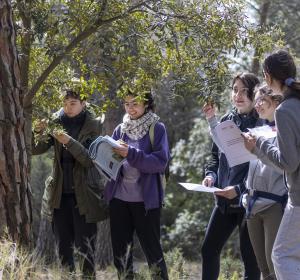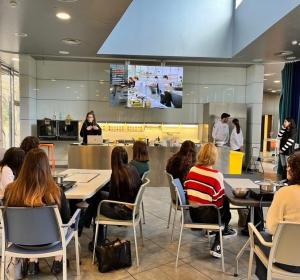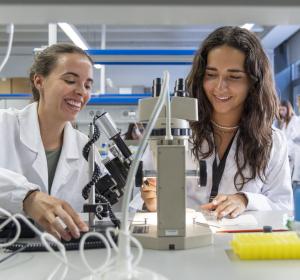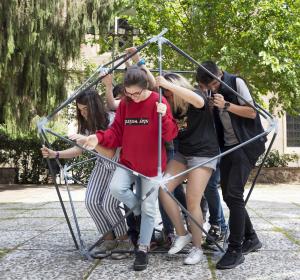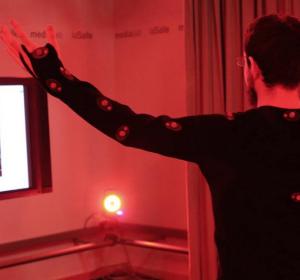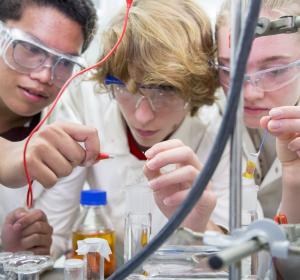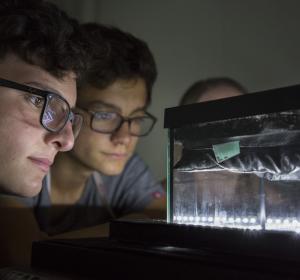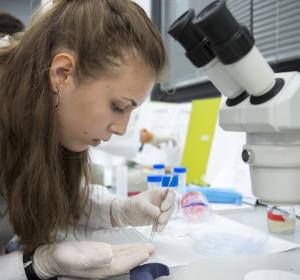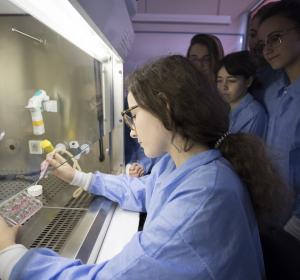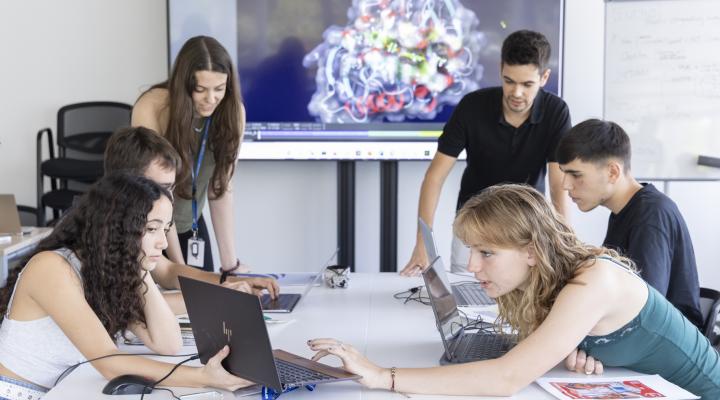
Supercomputing
The course
Bojos per la Supercomputació is a course developed by the Barcelona Supercomputing Center - National Supercomputing Center (BSC) and Fundació Catalunya La Pedrera, aimed at high school students with a scientific vocation interested in STEM careers (Science, Technology, Engineering, Mathematics). This course arises with the idea of introducing the multidisciplinary environment offered by supercomputing where different disciplines come together to solve all kinds of problems. The main objective of this course is to encourage scientific vocations and promote knowledge and education of excellence of young people in Catalonia.
Registrations for the Crazy about Supercomputing course will be open from September to October 2023 and among all those registered, 25 students of 1st baccalaureate will be selected to participate in the course, within the 12th edition of the Crazy about Science program that will take place in 2024.
The course will be held on different Saturdays from January to May 2024 at the Barcelona Supercomputing Center facilities.
During the 15 theoretical-practical sessions (plus the closing ceremony) students will learn first-hand what supercomputers are and how they work and different types of research that can be carried out using supercomputing. They will also be introduced to frontier technologies in the world of computing, such as Artificial Intelligence and Quantum Computing.
To participate in this course it is necessary for students to bring a laptop to the sessions.
Sessions 2024
Session 1. What is a supercomputer?
Date: Saturday January 20, 2024 (to be confirmed).
Hours: 9.30am to 2pm.
Place: Barcelona Supercomputing Center.
Coordination of the session: Sara Ibáñez.
Session in charge of: To specify.
Language: Catalan.
To begin Supercomputing Crazy, students will learn what a supercomputer is, what parts are needed to make it work, what are the differences and also similarities to a desktop computer, what makes them so fast and necessary for research scientific The session will consist of an introduction to supercomputing and a full tour of MareNostrum and the facilities that make it work.
Session 2. Programming methods and tools for supercomputers
Date: Saturday January 27, 2024 (to be confirmed).
Hours: 9.30am to 2pm.
Place: Barcelona Supercomputing Center - Plaça Eusebi Güell, 1-3
Coordination of the session: Sara Ibáñez.
Language: Catalan.
This session introduces the Linux operating system and the most basic tools for programming applications on supercomputers. The concepts of Linux user session, command line tools, file editing, compilers and interpreters, C, C++, Fortran and Python languages or computer structure, among others, are introduced. The session takes place only "online" and during it the students are supported to configure the Bojos virtual machine correctly, in cases where there was a problem with the previous installation).
Session 3. Parallelism
Day: Saturday, February 3, 2024 (to be confirmed).
Hours: 9.30am to 2pm.
Place: Barcelona Supercomputing Center - Plaça Eusebi Güell, 1-3.
Coordination of the session: Sara Ibáñez.
Language: Catalan.
In this session we will see the details that are necessary to take advantage of parallel execution in supercomputers. Each problem that we want to solve in parallel has its particularities and difficulties. In addition, in a supercomputer we must take advantage of the parallelism within each computer (node) and between them. We will see what mechanisms we must use to achieve an efficient coordination of the different tasks of the applications, whether they run locally on the same node or on another remote node. The problems we are solving will also be presented with real code examples. The session will include the presentation of the basics of the application execution environment (GNU/Linux and libraries and support), and simple parallel application executions on a real system with the extraction and analysis of traces with the Extract and Paraver tools developed at BSC.
Session 4. Simulating the passage of time in a virtual laboratory
Date: Saturday, February 10, 2024 (to be confirmed).
Hours: 9.30am to 2pm.
Place: Barcelona Supercomputing Center - Plaça Eusebi Güell, 1-3.
Coordination of the session: Sara Ibáñez.
Language: Catalan.
Scientists dream of reproducing the temporal evolution of real physical phenomena through computer simulations. We will see how mathematics provides different methods to represent the passage of time and how they are used in supercomputers.
Session 5. Supercomputing in Biomedicine: a factory of virtual humans
Date: Saturday, February 17, 2024 (to be confirmed).
Hours: 9.30am to 2pm.
Place: Barcelona Supercomputing Center - Plaça Eusebi Güell, 1-3.
Coordination of the session: Sara Ibáñez.
Language: Catalan / Spanish.
Have you ever wondered how you breathe? And what happens when you breathe? Where do the pollutants that we unfortunately have to breathe arrive? What if I need an inhaled medication? Will it have the expected effect? All these questions and many others can be answered every day with greater precision thanks to the simulations that can be done with supercomputers. Taking advantage of advances in medical imaging, we can obtain a virtual respiratory system of a patient and analyze what is happening by solving the (very complex) equations that govern the fluids by coupling it to the transport equations and as geometry, your virtual self ! Introducing the future of medicine, now!
Session 6. Simulating the Earth
Date: Saturday, February 24, 2024 (to be confirmed).
Hours: 9.30am to 2pm.
Place: Barcelona Supercomputing Center - Carrer de Jordi Girona, 31.
Coordination of the session: Sara Ibáñez.
Language: Catalan.
The interior of the Earth, despite looking like a round, boring rock, is still a great unknown to most of us. From time to time, it surprises us with great demonstrations of force, such as earthquakes and volcanoes, which give us a hint that maybe things are not as peaceful in there as we expected... Through physics, mathematics and supercomputers we can learn to discover - its properties and understand how it works.
Session 7. Data infrastructure
Date: Saturday March 2, 2024 (to be confirmed).
Hours: 9.30am to 2pm.
Place: Barcelona Supercomputing Center - Plaça Eusebi Güell, 1-3.
Coordination of the session: Sara Ibáñez.
Language: Catalan.
Due to technological evolution, each human generates, voluntarily and involuntarily, almost 2MB of data every second, making 2.5 trillion bytes generated every day. Analyzing this data provides so much value and information that it is considered that "data is the new oil". In order to do this "refining" of data, it is crucial to have data infrastructures that allow it to be managed throughout the process. In this session we will learn the types and fundamental parts of these infrastructures. Plus, we'll practice how to get insights from, and get the most out of, world-renowned data infrastructures.
Session 10. Word from a climatologist
Date: Saturday March 23, 2024 (to be confirmed).
Hours: 9.30am to 2pm.
Place: Barcelona Supercomputing Center - Plaça Eusebi Güell, 1-3.
Coordination of the session: Sara Ibáñez.
Language: Catalan.
Put yourself in the shoes of a climate researcher and work together with our scientists to discover the fascinating world of atmospheric processes. What do we mean when we talk about the climate? Can a model be built that accurately unifies the behavior of the oceans and the atmosphere? Discover how one of the most powerful supercomputers in Europe, powered by millions of dates, allows us to predict the climate of the future. You will do it with your hands and you will believe it: word of a climatologist!
Session 11. Introduction to genomics
Day: Saturday, April 13, 2024 (to be confirmed).
Hours: 9.30am to 2pm.
Place: Barcelona Supercomputing Center - Plaça Eusebi Güell, 1-3.
Coordination of the session: Sara Ibáñez.
Language: Catalan and Spanish.
What makes us different from people? What diseases can we develop throughout our lives? Identifying mutations in our DNA can help us both to detect diseases and to know our origins or to know who our father is. We will see how variations in our genome are detected and interpreted.
Session 12. Proteins and drug design
Day: Saturday, April 20, 2024 (to be confirmed).
Hours: 9.30am to 2pm.
Place: Barcelona Supercomputing Center - Plaça Eusebi Güell, 1-3.
Coordination of the session: Sara Ibáñez.
Language: Catalan.
Enzymes are a type of protein that allow life as we know it to exist. Small changes in their sequence, known as mutations, can alter their efficiency and lead to the appearance of diseases or drug resistance processes. Using bioinformatics tools, we will learn the basics of some diseases and how a personalized treatment can be made for each patient.
Sessions 15 and 16. Sustainable mobility
Day: Saturday in November, 2024.
Hours: 9.30am to 2pm.
Place: Barcelona Supercomputing Center - Plaça Eusebi Güell, 1-3.
Coordination of the session: Sara Ibáñez.
Language: Catalan and Spanish.
In large cities, a large volume of road traffic moves, which generates high levels of pollution. One of the great challenges facing smart cities is to use all the information that can be extracted from vehicles in motion as well as from the fixed infrastructures found on the streets to calculate how many emissions the vehicles generate at any given time, and use this information to make decisions in terms of mobility management. In this session we will focus on the calculation of city emissions from mobility data that can be extracted with mobile technologies, and we will experiment with different ways to estimate and control pollutant emissions in the city.
Session 17. Closing
Date: Saturday in November to be determined, 2024.
Hours: to be defined
Place: Barcelona Supercomputing Center - Plaça Eusebi Güell, 1-3
Session 8. Introduction to artificial intelligence
Date: Saturday March 9, 2024 (to be confirmed).
Hours: 9.30am to 2pm.
Place: Barcelona Supercomputing Center - Plaça Eusebi Güell, 1-3.
Coordination of the session: Sara Ibáñez.
Language: Catalan.
What is? What is it for? Where will it take us? These are the questions that will guide us in the first artificial intelligence (AI) session. Participants are expected to explain what they think can be achieved. The idea will be introduced that many AI algorithms try to copy the intelligence already present in nature to apply it to solving specific problems.
At this point, different AI technologies will be explained, such as genetic algorithms, search algorithms, game theory... We will emphasize Machine Learning algorithms, and how they are based on statistics and the scientific method , with a workshop where attendees can experience and solve problems like this.
Session 9. Deep Learning
Date: Saturday March 16, 2024 (to be confirmed).
Hours: 9.30am to 2pm.
Place: Barcelona Supercomputing Center - Plaça Eusebi Güell, 1-3.
Coordination of the session: Sara Ibáñez.
Language: Catalan.
Continuing with the idea introduced in the AI session, the human brain will be addressed. A brief introduction to the biological basis of the brain will be made and parallels will be drawn with artificial neural networks. After this introduction, it will be explained how they encode information in a useful and efficient way. After the more theoretical session, some practical games will be proposed to help better understand the functioning of neural networks.
Sessions 13 and 14. Get closer to quantum computing
Date: Saturdays in October to be determined, 2024.
Hours: 9.30am to 2pm.
Place: Barcelona Supercomputing Center - Plaça Eusebi Güell, 1-3.
Coordination of the session: Sara Ibáñez.
Language: Spanish.
In this session, we will explain the basic concepts of quantum computing, mainly its building blocks, qubits (quantum bits). In addition, we will create users to use the IBM Quantum Experience, a platform that allows you to compose, as if it were a musical score, quantum algorithms and then simulate them or send them, in real time, to one of the quantum computers of IBM. And we will be able to test the probabilistic results characteristic of quantum mechanics using some simple program.
The course will cover the following areas:
- Introduction to Supercomputing.
- Mathematics for supercomputing.
- Simulations.
- Artificial Intelligence.
- Climate change study.
- Quantum computing.
- Computational biology.
- Blockchain.
- Sustainable cities.
Specific objectives of the course
Around academic studies
- To encourage among young people scientific vocations linked to supercomputing in particular and computer science in general, as an object of study and as a tool for research.
- To offer the opportunity to have their baccalaureate research work authorized by a reference research center.
Research environment
- To make students aware of the importance of supercomputing in different areas of research: supercomputing is the third pillar of science and engineering.
- To learn about the operation of research centers linked to supercomputing.
- To value multidisciplinarity and technology as necessary elements for the progress of knowledge.
Supercomputing environment
- To learn that supercomputing is a necessary tool in different scientific disciplines.
- To understand the difference between basic research and applied research in supercomputing.

